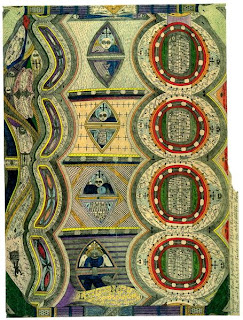"Every Monday morning Wölfli is given a new pencil and two large sheets of unprinted newsprint. The pencil is used up in two days; then he has to make do with the stubs he has saved or with whatever he can beg off someone else. He often writes with pieces only five to seven millimetres long and even with the broken-off points of lead, which he handles deftly, holding them between his fingernails. He carefully collects packing paper and any other paper he can get from the guards and patients in his area; otherwise he would run out of paper before the next Sunday night. At Christmas the house gives him a box of coloured pencils, which lasts him two or three weeks at the most."
Wolfli's images were complex, intricate and intense. He took his images right to the edges of his working surface with detailed borders and text, often incorporating musical notation as well. The musical notes were initially used as decorative elements, but eventually developed into real compositions which Wolfli would play on a paper trumpet.
In 1921, Walter Morganthaler published a monograph on Wolfli's life and work: Madness and Art: The Life and Works of Adolph Wolfli. This was the first time that Wolfli's art was made public.
In 1945, Jean Dubuffet, artist and founder of Art Brut, discovered Wolfli's work, as did surrealist painter Andre Breton, who considered body of work " one of the three or four most important works of the twentieth century."














wow!
ReplyDeleteCool
ReplyDelete